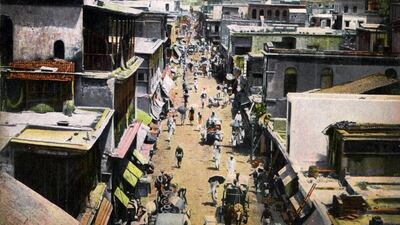Historical crime fiction is a tricky literary sub-genre, one that requires a deft balancing act, an equal proportion of intoxicating whodunit mystery and authentic period detail.
It is easy to do badly, which is perhaps why the best books in the field are those penned by experienced writers adept with, and unafraid of, different styles and eras. Still able to excite and convince are Philip Kerr and Benjamin Black – the former with sardonic sleuth Bernie Gunther in the Third Reich, the latter with eccentric pathologist Quirke in 1950’s Dublin.
With this in mind, we are allowed to worry that Abir Mukherjee, a London-based accountant-turned-author, has bitten off more than he can chew in producing a debut crime novel set in British India. However, by the end of the first chapter of A Rising Man it becomes clear that Mukherjee is more than capable of enthralling with the requisite pace, thrills, intrigue and historical verisimilitude.
Mukherjee plays safe by presenting a standard corpse on page one, but swiftly proceeds to create original touches, albeit within a familiar framework. We are in Calcutta in 1919, and the dead body is that of a tuxedoed British civil servant. The unfortunate sahib is found in a dark alley with a bloodstained piece of paper scrunched up in his mouth on which is written a warning to all British – leave India or more blood will flow.
For former Scotland Yard detective Captain Sam Wyndham, fresh off the boat from London, this seems like a cut-and-dried case: a blatant act of terrorism by Bengali revolutionaries. But when military intelligence muscle in and commandeer the crime scene, Wyndham gets suspicious and starts probing in different corners.
His inquiries take him from the mansions, clubs and wide avenues of the White Town quarter to the tenements, brothels and congested streets of the Black Town.
As in most crime novels, one murder is never enough, and in time Wyndham finds himself investigating whether a death on a train was the result of a botched robbery and whether his main eyewitness hanged herself or was bumped off for having seen too much.
Mukherjee builds a vivid cast around Wyndham, including a powerful industrialist, a Scottish vicar, an English landlady who bewails the “nefarious natives”, an elusive freedom fighter called the Ghost, and prostitutes named after Hindu goddesses.
Wyndham is driven around by rickshaw wallah Salman, falls for beautiful secretary Annie, and has a rival in sub-inspector Digby and a sidekick in Sergeant “Surrender-not” Banerjee – one of the few Indians in the Imperial Police Force.
And then there is Wyndham himself, a widower and guilty survivor of the Great War who has ventured East to make a new start. At first glance he is rather faceless and bland for a detective, lacking identifiable traits, affectations or accoutrements. But the more we follow him him, the more interesting facets he reveals such as his cravings for opium.
During several exchanges we see him as a good man in India, if not vocally objecting to the Raj and the white man’s burden then at least silently critical of imperial attitudes (“any notions I may once have held about British superiority had died back in Flanders alongside my friends”).
And while he is no wisecracking Philip Marlowe or Sam Spade, his narration is infused with a wry cynicism. Prison cells “boast ensuite facilities in the form of a bucket in the corner”. Death “smells worse in the tropics. Most things do.”
Mukherjee also brings colonial Calcutta spectacularly alive, both its rough and its smooth. As his characters traverse the city they offer trenchant asides on its merits and failings. Calcutta is “a prominent, yet problematic outpost of empire” in what one Anglo-Indian character terms “a land of hypocrites”.
After a civilian massacre Calcutta becomes a tinderbox – to such an extent that we wonder if Wyndham’s race to nab the guilty party and save an innocent man from the gallows will be enough to secure a happy ending.
A Rising Man is amply stocked with red herrings, scapegoats, cliffhangers and twists, but also comes with several clunky clichés. Fortunately they don't tarnish Mukherjee's overall achievement: a crime novel that is, quite simply, enormous fun. Wyndham's next assignment can't come soon enough.
Malcolm Forbes is a freelance reviewer based in Edinburgh.

